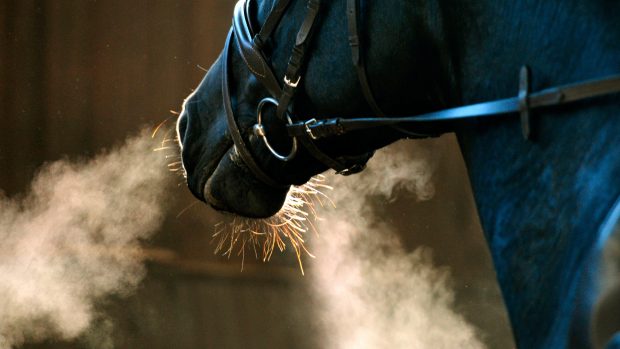The respiratory tract is a common point of entry for many infections that can quietly take a hold despite showing no visible signs until the infection is well established. This is a good enough reason to consider quarantining all new arrivals at a yard.
A horrified horse owner may suddenly find that their horse has developed a respiratory infection with a combination of one or more of the following signs:
- A dirty nose
- A nasal discharge — this could be watery or thicker and yellow
- Swollen glands in the throat
- Fever
- Lack of appetite
- Depression
- Abscesses in the throat region
Depending upon which signs are presented, in an unvaccinated horse a dry cough, lack of appetite and high fever, for example, may be equine influenza, whereas a thick yellow nasal discharge and swollen glands may suggest strangles.
But all these signs can have many different causes. Flu is generally avoidable by vaccination, and although strangles is a common equine bacterial infection, a vet is unlikely to be able to determine exactly what infection is involved without laboratory testing.
Vet Karen Coumbe of Bell Equine recommends that “regular vaccination is advisable to reduce the severity of respiratory disease, and horse owners should contact their own vet for advice”.
Respiratory infections are common when large numbers of young, susceptible horses are brought together at sales and shows or for weaning and training.
Such infections can be spread by a number of factors:
- Direct contact — for example, horses touching noses and sharing water troughs
- Via human contact on clothes, buckets, hands and tack, etc
- Infected bedding, dried pus or nasal discharge — the strangles bug can live in these for weeks
If a respiratory infection is suspected, the following steps should be taken:
- Take the horse’s temperature regularly — it may be worth checking healthy horses too. An increased temperature may be an early indication of infection (use separate thermometers or disinfect)
- Isolate infected horses
- Avoid all contact between healthy and sick horses
- Provide adequate ventilation
- Be vigilant about hygiene and handling. Do not allow those caring for infected horses to handle others on the yard without a change of clothes and a shower
- Ensure all horses are vaccinated
- Maintain separate feeding, cleaning and grooming kit and, ideally, personnel for sick horses
- Treat any suspicion of a respiratory infection with care and contact your vet
This article was originally published in Horse & Hound as part of its popular Accident & Emergency series.
|
||
 |
||


 Get up to 19 issues FREE
Get up to 19 issues FREE TO SUBSCRIBE
TO SUBSCRIBE 


